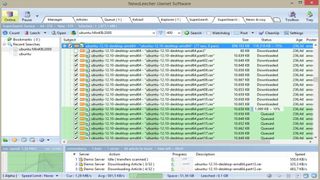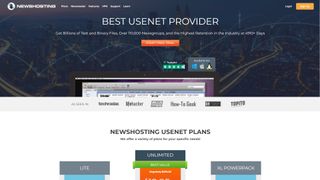How to get free Usenet access
We outline how to access Usenet for free in our step-by-step guide, covering the options open to you and paid alternatives

Free Usenet access isn't easy to come by, but for decades this network was one of the primary ways people on the internet would share files and interact with each other. Since the advent of modern web forums like Reddit, Usenet has become less popular, but that doesn’t mean it still isn’t important to many users.
Newsgroups categorised into almost anything you can think of comprise the Usenet networks, and let people upload, download and share files between each other. These might include software, apps, as well as individual media files like photos, videos or even music.
Usenet newsgroups operate on a different network to the rest of the world wide web, however, so it’s impossible to use a conventional web browser like Chrome, Edge or Firefox to access these spaces. This means having to pay a fee to one of the best Usenet providers to access this network.
There are, nevertheless, many ways to get access to Usenet newsgroups so you can take part in conversations and share files with other users for very little – or often for no charge at all if you can take advantage of free trials. Read on, and see our step-by-step guide on how to access Usenet for free.
Getting free Usenet access step-by-step guide
Getting free Usenet access can be tricky, which is why we've produced this step-by-step guide to help you.
Preparation
There are two things you will normally need to pay for if you want to access Usenet newsgroups, conversations, and files—a Usenet newsgroup reader and a Usenet access provider.
Understanding the two aspects of Usenet access that might cost you money
A Usenet newsgroup reader is a software application that you’ll use to find and search newsgroups, take part in conversations, or upload and download files. Think of it like an email client or a web browser, but specifically designed for newsgroups.
Get the ITPro. daily newsletter
Receive our latest news, industry updates, featured resources and more. Sign up today to receive our FREE report on AI cyber crime & security - newly updated for 2024.
A Usenet access provider is a service that lets you access the newsgroup network—since newsgroups aren’t available on the web. Think of this service like a subscription you need to pay to get specialist content.
Next, we’ll explore how much a Usenet newsgroup reader might cost you, and how to get one for free.
Get a free Usenet newsgroup reader

Our guide to the best Usenet newsgroup readers covers the most popular and fully-featured software for accessing Usenet. As part of researching that guide, we discovered that reader software fell into one of three cost categories:
- Standalone newsgroup readers that you pay money for, separate to Usenet network access through a provider; examples include Newsleecher at $9.49 a month, and Newsbin Pro at $30 a year
- Newsgroup readers from Usenet access providers that are free if you get a trial or buy access; examples include Newshosting and Easynews
- Newsgroup readers that are completely open-source and free; examples include SABnzbd and NZBGet
Downloading and installing SABnzbd or NZBGet is free, and you can use either of these applications as your newsgroup reader. There’s just one problem here—both of these programs can only be used to access files on Usenet newsgroups. Neither of them allows access to conversations and threads in newsgroups.
For those, you’ll need one of the other newsgroup reader options, or Google Groups, which we will cover later. Now you have the software you need, let’s explore Usenet access providers.
Find a free or low-cost Usenet access provider

We’ve solved one-half of the Usenet access puzzle—the newsgroup reader. Now it’s time to look at the other side—your access provider. Unfortunately, we don’t have quite as many options for completely free access.
All Usenet providers, apart from Google Groups, do charge for access. But, some of them do offer free trials, so you can at least try them out for free to see if they’re worth subscribing to. Our guide to the best Usenet providers lists the most popular options: we'll dig into some of these below, and discover who provides some Usenet access for free, including some deals you can take advantage of.
Here’s the cheapest option for each provider and the length of their free trials.
Usenet providers offering access for $75 or less a year
Usenet providers offering access for $120 or less a year
- Eweka: Seven days of free Usenet access, then approximately $7.80 a month
- UsenetServer: $7.95 a month
- Giganews: 14 days of free Usenet access, then $8.33 a month
- Astraweb: $8 a month
- Easynews: Three months of free Usenet access, then $9.99 a month
Usenet providers offering access for $150 or less per year
- Newsleecher: 14 free days of Usenet access, then $9.49 a month
- Tweaknews: approximately $10.75 a month
- Supernews: Three free days of Usenet access, then $5.99 for the first month and $11.99 for each month after that
Usenet providers offering the longest free trials
- Newshosting: Three free months of Usenet access, then $5.99 a month
- Easynews: Three free months of Usenet access, then $9.99 a month
- Giganews: 14 free days of Usenet access, then $8.33 a month
- Newsleecher: 14 free days of Usenet access, then $9.49 a month
Each of these providers offers slightly different services in terms of download speeds, concurrent connections, how long they retain files, and similar factors.
Google Groups is also a Usenet access provider, but it’s limited in what it can do, so we haven’t included it as an option here. We’ll explain why a little later.
In the meantime, take a look at each of the providers, and choose the one that best suits your needs.
Some Usenet providers also offer free reader software
In step two, we talked about newsgroup reader software, and mentioned that only a couple of them were completely free and open-source, but that they only allowed you to download files. We also mentioned that some Usenet providers also offer free software if you subscribe to their services.
Two providers that do this are Newshosting and Easynews: if you decide to try out their free trials, you can download the software without charge, then take part in conversations and download files.
Use your newsgroup reader and access provider to start browsing Usenet
Once you have your newsgroup reader software and Usenet access, you can start using the network. Your access provider should give you all the information you need to configure and set up your Usenet client. From there, it’s just a case of learning the software and accessing newsgroups.
Honourary mention for free, limited Usenet access: Google Groups

There is a completely free way to access Usenet that we mentioned earlier – Google Groups. Google acquired an archive of Usenet posts many years ago and continues to index Usenet newsgroups and conversations. Today, Google operates two versions of Google Groups:
- As a workplace tool allowing for business communications and message management
- As an archive of Usenet newsgroup posts that individuals can search through and interact with
Unfortunately, there are some issues with Google Groups as a Usenet provider:
- Google Groups isn’t very easy to use for searching Usenet newsgroups, with searching and posting both being unintuitive and awkward
- Google Groups does not provide access to newsgroups—known as binaries groups—that are primarily used for sharing files
If you just want to subscribe to certain newsgroups and take part in conversations, then Google Groups is an option, providing you don’t mind the UI. If you want to upload, download, and share files, Google Groups doesn’t allow for that functionality, and you’ll need to choose a different access provider.
How to access Usenet for free: Bringing it all together
Let’s recap how to access Usenet for free:
- Get a newsgroup reader, with your free, open-source options being SABnzbd and NZBGet
- Get a free trial for Usenet access: we’ve linked to several free trial options in a breakdown of providers here, and in our guide to the best Usenet providers; free trials range between three days and three months
- If you use a paid provider, even with a free trial, you have more options for the reader software you can use
- Decide if you’d like to pay for access when your free trial ends; the best deals mean you can get a year’s worth of access for around $75
- Browse, search, and use newsgroups to take part in conversations and download files
We hope you find the perfect reader software and access to meet all your Usenet needs.
Further reading on Usenet
Learn how to download from Usenet, if you're interested in downloading files from the platform. It's also worth learning about Google Groups, another modern method for accessing Usenet; and take a look at our other reviews of top Usenet providers, including Eweka, EasyNews, UsenetServer, and Giganews.
Paul is a highly experienced professional writer who creates extensively researched, expert, in-depth guides across business, finance, and technology.
Boasting over 20 years of business experience working across large corporations, Paul started his own business in 2006. This gives him a unique, first-hand understanding of the challenges businesses and entrepreneurs face.
Paul loves the challenge of taking complex subjects and breaking them down so they are easily understood. He specializes in creating content spanning a variety of formats, including website copy, blogs, knowledge bases, white papers, support guides, tutorials, and in-depth articles.





